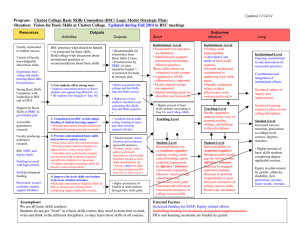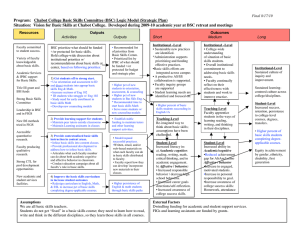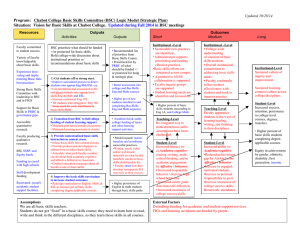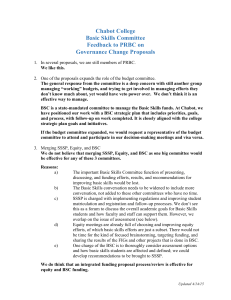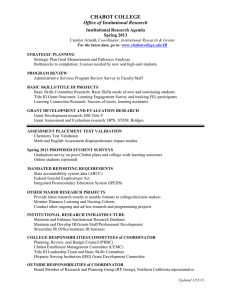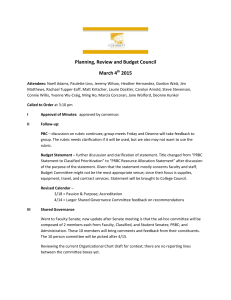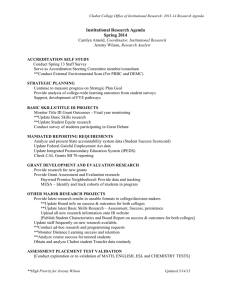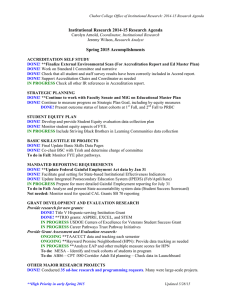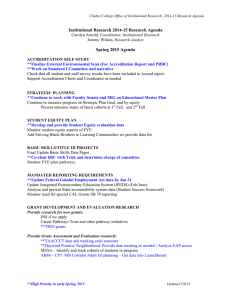Program: Chabot College Basic Skills Committee (BSC) Strategic... Situation: Vision for Basic Skills at Chabot College. ...
advertisement
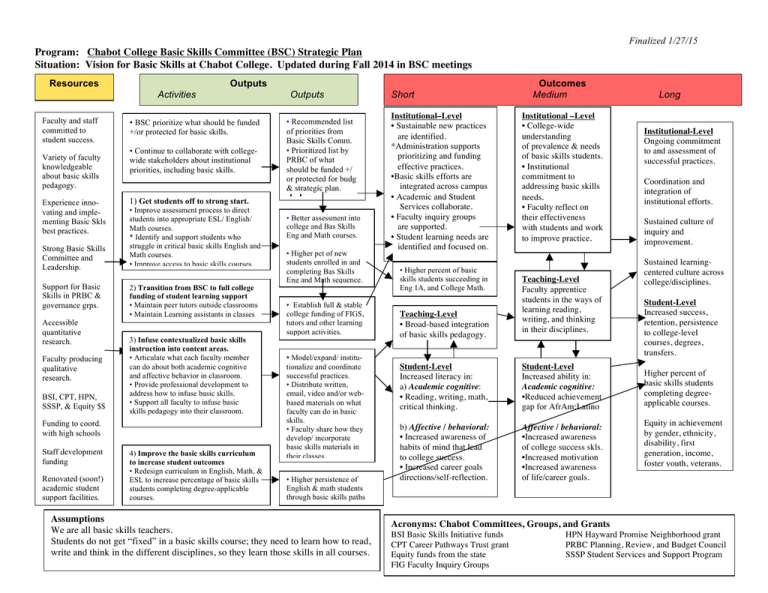
Finalized 1/27/15 Program: Chabot College Basic Skills Committee (BSC) Strategic Plan Situation: Vision for Basic Skills at Chabot College. Updated during Fall 2014 in BSC meetings Resources Outputs Activities Faculty and staff committed to student success. Variety of faculty knowledgeable about basic skills pedagogy. Experience innovating and implementing Basic Skls best practices. Strong Basic Skills Committee and Leadership. Support for Basic Skills in PRBC & governance grps. Accessible quantitative research. Faculty producing qualitative research. BSI, CPT, HPN, SSSP, & Equity $$ • BSC prioritize what should be funded +/or protected for basic skills. • Continue to collaborate with collegewide stakeholders about institutional priorities, including basic skills. 1) Get students off to strong start. • Improve assessment process to direct students into appropriate ESL/ English/ Math courses. * Identify and support students who struggle in critical basic skills English and Math courses. • Improve access to basic skills courses. 2) Transition from BSC to full college funding of student learning support • Maintain peer tutors outside classrooms • Maintain Learning assistants in classes 3) Infuse contextualized basic skills instruction into content areas. • Articulate what each faculty member can do about both academic cognitive and affective behavior in classroom. • Provide professional development to address how to infuse basic skills. • Support all faculty to infuse basic skills pedagogy into their classroom. Funding to coord. with high schools Staff development funding Renovated (soon!) academic student support facilities. 4) Improve the basic skills curriculum to increase student outcomes • Redesign curriculum in English, Math, & ESL to increase percentage of basic skills students completing degree-applicable courses. Outputs • Recommended list of priorities from Basic Skills Comm. • Prioritized list by PRBC of what should be funded +/ or protected for budg & strategic plan. ! ! • Better assessment into college and Bas Skills Eng and Math courses. • Higher pct of new students enrolled in and completing Bas Skills Eng and Math sequence. • Establish full & stable college funding of FIGS, tutors and other learning support activities. Short Institutional–Level • Sustainable new practices are identified. *Administration supports prioritizing and funding effective practices. •Basic skills efforts are integrated across campus • Academic and Student Services collaborate. • Faculty inquiry groups are supported. • Student learning needs are identified and focused on. • Higher percent of basic skills students succeeding in Eng 1A, and College Math. Teaching-Level • Broad-based integration of basic skills pedagogy. Outcomes Medium Institutional –Level • College-wide understanding of prevalence & needs of basic skills students. • Institutional commitment to addressing basic skills needs. • Faculty reflect on their effectiveness with students and work to improve practice. Teaching-Level Faculty apprentice students in the ways of learning reading, writing, and thinking in their disciplines. • Model/expand/ institutionalize and coordinate successful practices. • Distribute written, email, video and/or webbased materials on what faculty can do in basic skills. • Faculty share how they develop/ incorporate basic skills materials in their classes. • Higher persistence of English & math students through basic skills paths Assumptions We are all basic skills teachers. Students do not get “fixed” in a basic skills course; they need to learn how to read, write and think in the different disciplines, so they learn those skills in all courses. Student-Level Increased literacy in: a) Academic cognitive: • Reading, writing, math, critical thinking. Student-Level Increased ability in: Academic cognitive: •Reduced achievement gap for AfrAm;Latino b) Affective / behavioral: • Increased awareness of habits of mind that lead to college success. • Increased career goals directions/self-reflection. Affective / behavioral: •Increased awareness of college success skls. •Increased motivation •Increased awareness of life/career goals. Long Institutional-Level Ongoing commitment to and assessment of successful practices. Coordination and integration of institutional efforts. Sustained culture of inquiry and improvement. Sustained learningcentered culture across college/disciplines. Student-Level Increased success, retention, persistence to college-level courses, degrees, transfers. Higher percent of basic skills students completing degreeapplicable courses. Equity in achievement by gender, ethnicity, disability, first generation, income, foster youth, veterans. Acronyms: Chabot Committees, Groups, and Grants BSI Basic Skills Initiative funds CPT Career Pathways Trust grant Equity funds from the state FIG Faculty Inquiry Groups HPN Hayward Promise Neighborhood grant PRBC Planning, Review, and Budget Council SSSP Student Services and Support Program
